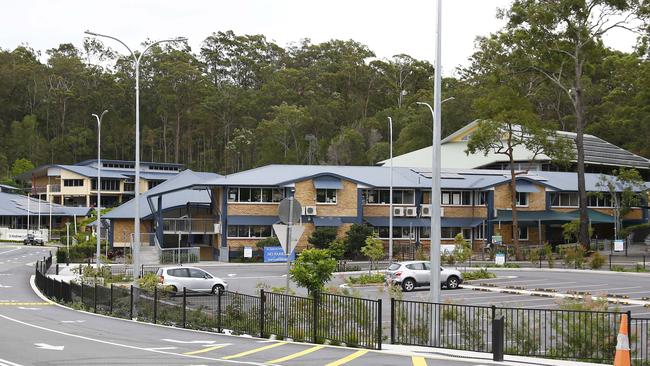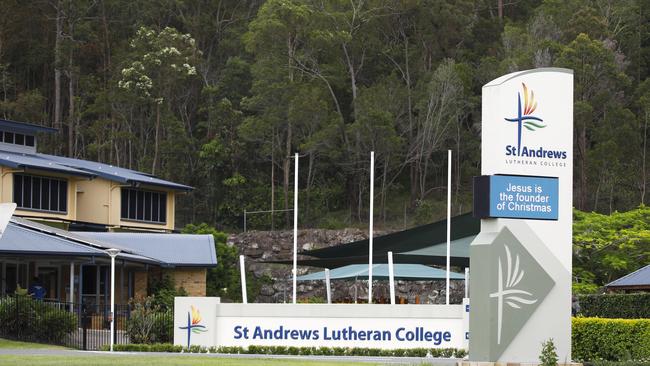Public Health Unit probes Gold Coast school ‘cancer cluster’ fears
EXCLUSIVE: Gold Coast health authorities are examining if multiple cancer cases among students at a private school are “above the expected number” – and amount to a “cluster”.
News
Don't miss out on the headlines from News. Followed categories will be added to My News.
The Gold Coast Public Health Unit is examining whether multiple cancer cases among students at a private school are “above the expected number” and amount to a “cluster”.
A letter from St Andrews Lutheran College principal David Bliss to parents of the Tallebudgera school reveals alleged cancer cluster concerns were investigated and dismissed back in 2017 but a new public health examination has now been launched after a 2020 case came to light.
GOLD COAST’S TOP ATAR STUDENTS OF 2020

His letter written three weeks ago points out four students have been known to have cancer while at the school in the past 10 years, including two active cases in 2017.
His letter also notes the school requested the Public Health Unit to “investigate these cases, their potential causality and if anything further needed to be done by the college to protect the health of the college community”.
The PHU assessment in 2017 noted “no correlation in cancer types diagnosed among those students”, Mr Bliss writes, adding: “Specifically, as there was no correlation in pathology or risk factors, it was considered that there were no plausible environmental factors causing the cases at the college at the time.”
FULL DIGITAL ACCESS: JUST $5 A MONTH FOR THE FIRST THREE MONTHS

But subsequently, late last year a college family – with a child under the care of an oncologist – contacted the Public Health Unit requesting “further investigation” and then informed the college, Mr Bliss writes.
The college and PHU have determined to follow a course of action as a result, he writes.
That action, still underway, includes a comparison between the current case and those that occurred in 2017, a release of all student demographic data to the PHU and a review of data and clinical notes “to consider whether the number of cases now known is above the expected number and if any ‘in common’ attributes can be identified”.
The school is still waiting on an outcome of the review, with Mr Bliss writing: “I will openly communicate those within our community.
“It should be noted that the PHU’s interim summation is, as in 2017, that there are no evident environmental factors that have a known link to the clinical cases now, or in recent history,” Mr Bliss wrote.
“However, as noted above, final reports once the work of the PHU has been completed will be shared when received.”
A Gold Coast Health spokesman confirmed the Gold Coast Public Health Unit (GCPHU) was working with the school and had previously investigated an “alleged cancer cluster” in 2017.
Parents at the school told the Bulletin there was significant concern about the latest case and it had been raised at a Parents and Friends (P&F) meeting in November.
At the time the P&F committee sought to have an independent ‘building biology report’ conducted on the school grounds.
Parents say the committee had offered to pay for the cost of the report, however at the stage it is unknown if the proposal was supported by the school.
In 2019 the school also commissioned an independent assessment of radiofrequency radiation assessment of the Wi-Fi networks at the College, which identified no concern, Mr Bliss wrote.
“In the meantime, I would reassure you that our water quality is tested multiple times each year by the Gold Coast City Council, our buildings comply with all Building Codes and Australian Standards for materials and construction.”
Mr Bliss said the letter was released to present the facts and provide accurate information.
Queensland Health defines a ‘cancer cluster’ as the occurrence of a specific type of cancer with more than the expected number of cases within a group of people in the same area over a period of time.
Statistics show in Queensland, one in every two males and one in every three females will develop cancer by the age of 80. In 2019, 1242 students attended St Andrews Lutheran College.
A spokesperson for the college on Thursday said the health and wellbeing of students and staff is the school’s greatest priority.
“The College has always been proactive in engaging with professionals such as the Gold Coast Public Health Unit to independently investigate matters requiring significant specialist expertise,” they said.
“The privacy of families and staff is paramount.”
The school also confirmed it was aware “a small number of staff” have been diagnosed with cancer during the school’s 28 years of operation.
“These cancers have had no pattern and no correlation to students with cancer in that period. In discussion with the PHU, no environmental factors are attributable to these cancers.
“The College remains committed to receiving and following the expert advice of an independent review.”


